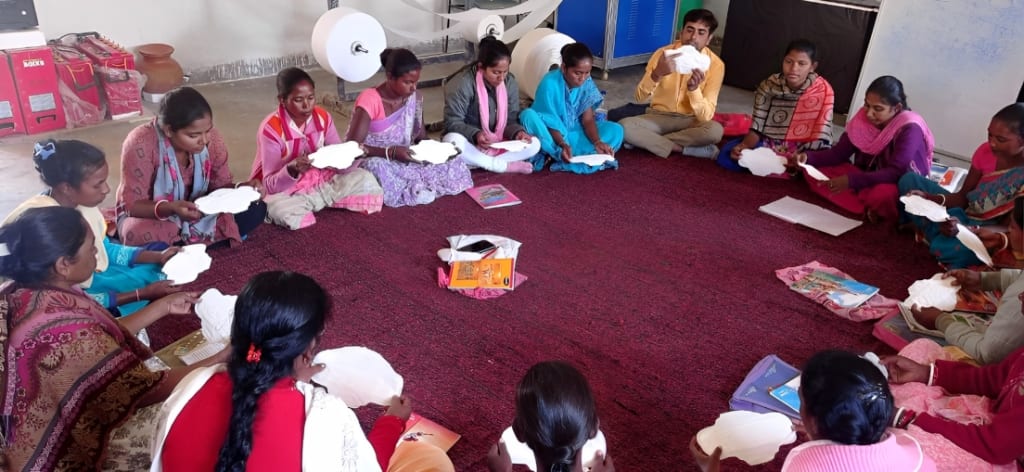Skill Development: Empowering Lives through Education and Training
Skill development is the process of gaining and honing particular information and abilities that improve employability, economic empowerment, and personal development. It supports social progress, lowers inequality, and provides individuals with the skills necessary to compete in a competitive labor market.

Introduction
The value of skill development cannot be emphasized in a world characterized by quick technical developments and constantly shifting work markets. For one to advance personally, economically, and socially, one must be able to develop and hone relevant talents. Skill development has become a potent instrument for NGOs (Non-Governmental Organizations) committed to uplifting marginalized communities to end the cycle of poverty and promote sustainable development. This article examines the importance of skill development programs offered by NGOs and how they affect people's lives.
The Significance of Skill Development
In order for people and communities to develop socioeconomically, skill development is essential. Giving people new skills makes them more capable of overcoming obstacles, adjusting to shifting conditions, and helping their communities advance. The following are some major justifications for why skill development is so crucial:
Employability: The demand for some talents increases as industries change and new technologies are developed, while others become obsolete. Through skill development programs, people can learn current, in-demand skills that improve their employability and increase their chances of finding lucrative jobs.
Economic Empowerment: People with the right skills can earn money and live independently. Poverty rates decline and the general standard of living rises when people can provide for their family and themselves.
Reducing Inequality: By offering chances for upward mobility, skill development projects close the gap between the rich and the marginalized. A more egalitarian society where everyone has an equal chance to succeed can result from this.
Promote entrepreneurship: Many skill-development programs not only transfer job-specific knowledge but also entrepreneurial know-how. Small business development is promoted, and local economies are boosted.
Enhancing Self-Confidence: Learning new talents gives people a sense of their own worth and self-confidence. Their personal and professional life is pleasantly affected by this newfound confidence.
NGOs and Skill Development
Non-Governmental Organizations (NGOs) play a pivotal role in skill development initiatives, especially in underserved and remote areas where access to quality education and vocational training is limited. NGOs have the flexibility and dedication to cater to the specific needs of local communities and tailor skill development programs accordingly. Some ways in which NGOs contribute to skill development include:
Identifying Local Needs: NGOs conduct thorough needs assessments to identify the skill gaps and demands of the community. By involving local stakeholders, they ensure that the training provided aligns with the needs of the job market.
Providing Vocational Training: NGOs offer vocational training programs that focus on practical skills required for various professions. These programs cover a wide range of fields, including agriculture, healthcare, information technology, handicrafts, and more.
Supporting Education: In addition to vocational training, NGOs often support formal education. They understand that a strong educational foundation enhances the overall effectiveness of skill development initiatives.
Empowering Women and Youth: NGOs emphasize empowering marginalized groups, including women and youth, through skill development. By doing so, they break gender barriers and empower the next generation.
Mentorship and Guidance: Skill development programs run by NGOs often include mentorship and guidance sessions. Experienced professionals mentor trainees, providing insights into the industry and helping them make informed career decisions.
Impact of NGO-led Skill Development Initiatives
The impact of skill development initiatives undertaken by NGOs can be seen across various aspects of individual and community development:
Economic Upliftment: The economic uplift of individuals and families is one of the most important effects of skill development programs. Beneficiaries get better-paying jobs or launch their own businesses as they develop marketable skills, increasing household incomes.
Reduced Unemployment: Developing one's talents gives one the tools needed to fulfill the demands of the labor market. As a result, unemployment rates drop, and general productivity among the workforce increases.
Community Development: When people build profitable enterprises or obtain lucrative jobs, they help to improve their local communities. As local economies grow, infrastructure and access to services are upgraded.
Empowerment of Women: Gender equality is significantly impacted by skill development programs for women. In addition to improving their own life, empowered women have a significant impact on their children's education and general well-being.
Reduction in Brain Drain: Skill development initiatives encourage individuals to seek opportunities within their own communities and countries. This reduces the brain drain phenomenon, wherein skilled workers migrate abroad in search of better prospects.
Social Transformation: Skill development nurtures self-confidence and a sense of achievement among beneficiaries. This leads to positive social transformations, as individuals become more engaged in community affairs and social activities.
Challenges and the Way Forward
While the impact of skill development initiatives is undeniable, NGOs face certain challenges in implementing and sustaining these programs:
Funding Constraints: Skill development programs require financial resources for training, infrastructure, and operational costs. Securing sustainable funding can be a challenge for many NGOs.
Quality of Training: Ensuring the quality of training is vital for the success of these programs. Training must align with industry standards and incorporate practical experiences to prepare beneficiaries effectively.
Keeping Pace with Technology: With rapid technological advancements, the skills demanded by the job market evolve rapidly. NGOs must continually adapt their training programs to keep pace with these changes.
Monitoring and Evaluation: Assessing the impact of skill development programs is crucial for their success. Proper monitoring and evaluation mechanisms help identify strengths and areas for improvement.
To address these challenges and maximize the impact of skill development initiatives, NGOs can:
Forge Partnerships: Collaborate with government bodies, private companies, and international organizations to pool resources, share expertise, and expand the reach of their programs.
Promote Sustainability: Develop income-generating projects or fee-based services that can help generate funds to support ongoing skill development initiatives.
Emphasize Digital Literacy: Integrate digital literacy training to equip beneficiaries with essential digital skills, as the world becomes increasingly reliant on technology.
Encourage Alumni Engagement: Create networks and platforms for program alumni to support each other, exchange knowledge, and act as mentors to new beneficiaries.
Conclusion
Skill development is an indispensable catalyst for personal growth, economic progress, and social transformation. NGOs have a special chance to take the lead in skill development projects, especially in regions with limited access to high-quality education and training. NGOs can have a positive ripple effect that changes people's lives and entire communities by addressing local needs, offering vocational training, and empowering marginalized groups. However, partnerships, creative ideas, and ongoing adaptation to changing conditions are required to guarantee the viability and success of these programs. In addition to making people more employable, skill development gives people the ability to take responsibility for their lives and realize their full potential.
Skill development is still a powerful tool in NGOs' arsenal for pursuing a more equal and prosperous society. It helps pave the way for a better future.






Comments
There are no comments for this story
Be the first to respond and start the conversation.